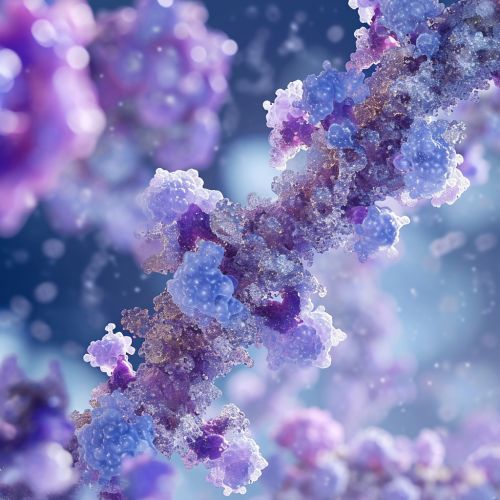NF-kB
Overview
The nuclear factor kappa-light-chain-enhancer of activated B cells (NF-κB) is a protein complex that controls the transcription of DNA, cytokine production and cell survival. NF-κB is found in almost all animal cell types and is involved in cellular responses to stimuli such as stress, cytokines, free radicals, heavy metals, ultraviolet irradiation, oxidized LDL, and bacterial or viral antigens. NF-κB plays a key role in regulating the immune response to infection. Incorrect regulation of NF-κB has been linked to cancer, inflammatory and autoimmune diseases, septic shock, viral infection, and improper immune development. NF-κB has also been implicated in processes of synaptic plasticity and memory.


Structure and Function
NF-κB is a fast-acting primary transcription factor, unlike other cellular molecules that first need to be activated from a latent state. The "kappa-light-chain-enhancer" in its name refers to the ability of NF-κB to upregulate the kappa light chain in B cells. Its function was initially understood as a regulator of the B lymphocyte response due to its ability to bind to a specific sequence motif in the kappa light chain enhancer of B cells. However, further research revealed that NF-κB is a broader transcription factor that is expressed in numerous cell types and has a wide variety of biological functions.
Activation
There are two distinct pathways for the activation of NF-κB: the canonical (or classical) pathway and the noncanonical (or alternative) pathway. Both pathways lead to the activation of the IκB kinase (IKK) complex, which subsequently phosphorylates the inhibitory IκBα protein bound to NF-κB, leading to its degradation and the release of active NF-κB.
Canonical Pathway
The canonical pathway is activated by a diverse range of stimuli, including proinflammatory cytokines such as tumor necrosis factor-alpha (TNFα) and interleukin-1 (IL-1), bacterial and viral antigens, and stress signals. The activation of this pathway results in the rapid but transient activation of NF-κB, which is then free to translocate into the nucleus and activate the transcription of target genes.
Noncanonical Pathway
The noncanonical pathway is slower and is primarily involved in the development and functioning of the adaptive immune system. This pathway is activated by a smaller subset of stimuli, including certain members of the TNF cytokine family. The activation of this pathway leads to the processing of the NF-κB2 protein p100 into p52, resulting in the formation of p52/RelB heterodimers that translocate into the nucleus and activate target gene transcription.
Role in Disease
Given its central role in immune and inflammatory responses, it is not surprising that dysregulation of NF-κB signaling pathways has been implicated in a wide range of diseases, including inflammatory and autoimmune diseases, cancer, and diseases of the nervous system.
Inflammatory and Autoimmune Diseases
NF-κB is a key regulator of inflammation, and its activation leads to the production of proinflammatory cytokines, chemokines, and adhesion molecules. Therefore, dysregulated or chronic activation of NF-κB can lead to persistent inflammation and the development of inflammatory diseases such as rheumatoid arthritis, asthma, and inflammatory bowel disease. Similarly, NF-κB plays a crucial role in the pathogenesis of various autoimmune diseases, including multiple sclerosis and type 1 diabetes.
Cancer
NF-κB has been implicated in the development and progression of cancer. It can promote cell proliferation, inhibit apoptosis, stimulate angiogenesis, and promote cell invasion and metastasis. Furthermore, chronic inflammation, which is associated with persistent NF-κB activation, is a known risk factor for the development of various types of cancer.
Diseases of the Nervous System
NF-κB is also involved in the nervous system, where it plays a role in neuronal survival and plasticity. Dysregulation of NF-κB signaling has been implicated in various neurodegenerative diseases, including Alzheimer's disease, Parkinson's disease, and Huntington's disease.
Therapeutic Targeting of NF-κB
Given the central role of NF-κB in many diseases, it has been the focus of many therapeutic development efforts. Various strategies have been explored to inhibit NF-κB activity, including the use of small molecule inhibitors, peptides, and oligonucleotides that interfere with NF-κB signaling. However, the development of effective and safe NF-κB inhibitors has been challenging due to the complex and pleiotropic nature of NF-κB signaling pathways.
